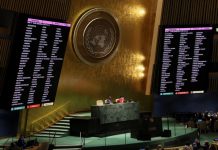The until now peaceful protests against military coup in Myanmar turned violent on Tuesday when police fired rubber bullets at demonstrators in capital Nay Pyi Taw who came on roads defying a ban. Two protesters sustained serious injuries.
Police used water cannons and tear gas against protesters, who gathered for the fourth successive day against removal of elected National League for Democracy (NLD) government on unsubstantiated allegation of fraud in November elections.
The military junta introduced new restrictions — a ban on large public gatherings and night-time curfews in some cities — with army commander Min Aung Hlaing warning that no-one is above the law.
Protesters in Myanmar have been demanding the release of elected leader Aung San Suu Kyi, along with senior leaders of her NLD party.
She was arrested when the military seized power last Monday. The army has declared a year-long state of emergency.
Police used water cannon against protesters, but they withstood the barrage of water fired at them and refused to retreat. Police then fired shots in the air, but the protesters showed no signs of fall back, forcing police to fire rubber bullets.
Braving the raining bullets, the protested raised slogans against the military dictatorship.
Doctors at a hospital said two people sustained injuries on head and chest. Another doctor in a clinic said he had treated three patients with wounds suspected to be from rubber bullets.
There are unconfirmed reports that police joined the protesters, and in some areas, they allowed demonstrators through their barricades.
Gen Min Aung Hlaing addressed the nation last night a week after the overthrow of the government. He continued to accuse the electoral commission of failing to investigate irregularities over voter lists in election.
The commission, however, had said there was no evidence to support claims of widespread fraud.
Gen Min Aung Hlaing promised elections overseen by a new “reformed” election commission, and said the military would hand power to the winner.
He claimed that his rule would be “different” from what was effectively a 49-year military rule that ended in 2011.
Meanwhile, New Zealand took first step to isolate military when it suspended all high-level contact with Myanmar and imposed a travel ban on its military leaders.
Prime Minister Jacinda Ardern also announced restrictions on aid to the military.





